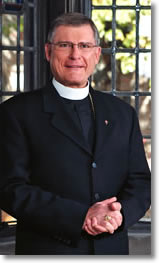by Rev. Jerry Kieschnick
 |
|
Matt White cannot walk, cannot talk, and can breathe only with the help of a ventilator. He has ALS, Lou Gehrig’s disease. But here he was, sitting in his specially equipped motorized wheelchair, “addressing” the Butler Bulldogs at a team meeting the day before Butler played Michigan State in the NCAA basketball tournament semi-final game April 3.
I caught part of his address, which was read by his wife, during a taped segment on TV just before the actual game. I have since learned that it took him days to get his words down on paper by using a special device connected to a computer.
White, a Butler alumnus, told the team, “I try to live like you play. You are my inspiration. I cannot wait to see you play live and in person tomorrow night.” He said that when he was diagnosed with ALS, he was given about four years to live. That was 10 years ago.
It was moving to listen to this man’s words being read by his wife as he sat motionless in his wheelchair, able to communicate only with great difficulty through God’s gift of technology, yet a very much alive, thinking, and feeling human being. An incident recounted in the Bible came to my mind:
“As [Jesus] passed by, He saw a man blind from birth. And His disciples asked Him, ‘Rabbi, who sinned, this man or his parents, that he was born blind?’ Jesus answered, ‘It was not that this man sinned, or his parents, but that the works of God might be displayed in him’” (John 9:1–3).
In this issue of The Lutheran Witness, you will find a story about the importance of including people with disabilities in the life of the congregation. For much of my own life, I have had a special place in my heart for people with specific disabilities.
When I was a seminary student, my part-time job one year was teaching a class of children with developmental disabilities. Although intellectually challenged, they had the ability to express themselves through many emotions, from anger and disappointment to joy and excitement. And while this was a public school, I did not hesitate to take every opportunity to speak of Christ and His love, forgiveness, and acceptance of them in a way they clearly understood. This proved to be a very important time in my life.
Then, as a young parish pastor, I volunteered two hours each week to direct a choir at the Beaumont (Texas) State Center for Human Development. The choir members were adults with moderately severe learning disabilities. My time spent with them made a lasting impression on me.
In John 9, Jesus said the blind man was not blind from birth because of any particular sin that he or his parents had committed, “but that the works of God might be displayed in him.”
Although challenged in many ways, I do not live with the difficulties faced by people with Lou Gehrig’s disease or developmental or other disabilities. The same is probably true of most of you. Still, what a blessing it is to know that God works in us all—regardless of our challenges or disabilities—to accomplish His gracious purpose. I thank God for
all the blessings He has bestowed on me and my family. And I believe you also have a grateful heart, thanking God with me for all the special blessings—including and especially the gift of eternal life through faith in His only-begotten Son—that He has given also to those whose blessings may not always be so obvious.
John 3:16 –17
Lives Transformed through Christ, in Time . . . for Eternity!
e-mail: president@lcms.org
Web page: www.lcms.org/president




